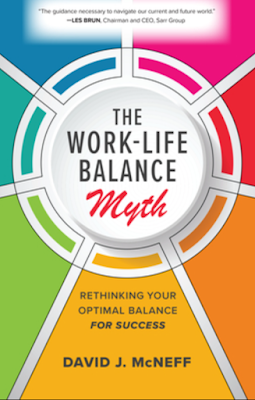ACHIEVING BALANCE IN LIFE: AN INTERVIEW WITH THE AUTHOR OF ‘THE WORK/LIFE BALANCE MYTH’ – DAVID J MCNEFF
 |
This comes as no surprise of course. Nowadays, with the increasingly demanding work spaces and academic curriculums, the rise in remote or at-home work, and the upsurge of media dedicated to the promotion of toxic productivity, a lot of people have found themselves devoting more time than is necessary to their work and abandoning other parts of their lives as a result. There is currently a widespread increase in stress levels and burnout across universities and work spaces as people have found themselves migrating from the 40-hour work week to 60 and even 80-hour work weeks.
Of course, for a person working for 80 hours out of 168, almost half of the person’s week gets devoted to work and with the hours set out for sleep, very little time is dedicated to doing other things that make life worth living.
But what if the issue cannot really be circumscribed into a mere work/life balance issue? What if the answer to the reduction of the increasing rates of stress and lack of balance in life comes, not from trying to achieve a fifty/fifty balance between work and this vague concept of ‘life’, but from the realisation of the fact that our lives cannot be divided into those two categories and that the only way to achieve a full and wholesome life is to be clear and mindful of the many other aspects of our lives that we often sacrifice on the altar of work or even trying to achieve the said ‘work/life’ balance.
I was looking for a work that really explains the concept of having a balanced life, a truly balanced life and not just a life that we try to divide into a 50/50 segment, and I came across a wonderful book titled, ‘The Work/Life Balance Myth’ written by David J McNeff.
I have written a previous review of this book here, and have reached out to the author to provide us with some insights as to how we can achieve a stress-free, balanced, and harmonious life without necessarily having to carve our lives into only two aspects but instead an understanding of the fact that our existence is composed of far more than just ‘work’ and ‘life’.
Enjoy my interview with author, life coach, and president of Peak Consulting Group in Massachusetts, United States, David J McNeff.
****
Q: When and how did the idea of the theories that you have laid down in your book come to mind in your life? Was it as a result of personal experiences, or solely on the basis of the experience of others that you got to listen to?
There was no one big event. It was just that part of my upbringing brought the knowledge that there were lots of parts to your life. And so as a teenager, I was sort of aware that these other parts or slices, as I listed in the book, mattered and were important. So, it was a small evolution that took place, and by the time that I got into my twenties and thirties, and forties, it had become a part of my life. And in my business, I began helping people that were under stress. So, it has been more of a part of my life, rather than this special process that took place.
Q: Can a person’s life be strictly said to be divided into only those seven slices? Do you believe, apart from times of retirement, that there could be times in a person’s life in which a person could have more or fewer slices of life?
Remember that the whole point of being aware of these slices is how to manage yourself and stress better. Where you choose to live your life is something different. So spending your time in these five, smaller, time-consuming slices of your life, is designed to help you live better in your family and professional life, meaning, that is where most of the pressure and stress in your life comes from.
So it really is up to you. You can live your life however you want, but the point of the Seven Slice method is, if you are under stress, knowing how to spend time in these other slices can help with the stress. Now, finding your meaning and purpose in life; that is a whole other question. But the Work/Life Balance Myth is about, ‘Can you live your life without feeling like you are going out of your mind?’ And the answer is yes, but that means that you have to live in these other slices for some amount of time per week. And you will find your stress levels come down and you feel like you are really now living in harmony with yourself.
Now, if you want to be a mountain climber or an astronaut, you can do whatever you want to do, but this method will help you live your life with a sense of more harmony and balance.
Can you live your life without feeling like you are going out of your mind?
Q: So all through your life, can you say that you have lived stress-free and in harmony and balance, using this method of yours?
Oh no, no, no. Nobody lives a stress-free life. Stress is constant. The question is, do you manage the stress, or does the stress manage you?
For a lot of people, it goes like, ‘Oh, I am having a good day because the stress level is low.’ Or ‘Oh, I am having a bad day because the stress level is high.’ But my pitch is, you can be the same every day, if you manage the stress, by living in these seven slices.
So when I work with people who go up and down, in the sense of, one day they are happy and the other day, they are depressed, I go, ‘You cannot live your life like that, that is crazy’ You have to try to be consistent and have a perspective and the only way to realise that is to take note of the fact that you have a personal, emotional, intellectual, and spiritual life.
You only have to spend minutes on the other five slices per day. And I achieve this by scheduling. So I schedule physical activities. I schedule time to sit and talk about feelings. I schedule time to read books, about 25 a year, two a month. On Sundays, I go to church services and read the bible three times a week. I schedule all this because it works for me.
You can decide not to schedule and do this whenever you feel like it. But when people do not spend time in any of the other slices of life, it gets them overwhelmed.
The question is, do you manage the stress, or does the stress manage you?
So I call that getting overwhelmed. When people find themselves getting overwhelmed, spending too much time at work, school or family, i.e. only one slice, that is when you have to pull yourself out to spend time in these other 5 slices in order to go back to that major slice with a better perspective. Because I think that what happens when there is too much focus on one slice, is that it becomes all or nothing. That is, I either spend all of my time on this one slice, or I will fail.
But the perspective changes when you begin spending time in these other five slices, all of a sudden, you realise that it is no longer life or death. It’s just a problem that needs to be solved. So that is how you can get out of being overwhelmed, you spend little bits of time in these other slices.
Q: How does a person incorporate some aspect of balance during those difficult moments of life, like during periods of emergency, in which a person seems compelled to sacrifice other slices of his or her life to focus on a singular slice?
So, there are emergencies, disasters, and crises, that require 100% of our time and attention. In my experience, during times of crisis, there is always a beginning, a middle, and an end. It does not go on forever. So my point is; deal with the crisis, and as the crisis comes to an end, go back to living in all seven slices.
Q: But during that period of crisis, it is alright for you to have an unbalanced life, even for that short period of time?
That is the whole point of it being an emergency, it is different from everyday life. So I get sick, it has a beginning, a middle, and an end, and then I have to slowly incorporate those other slices of my life so that they can help me deal with the post-emergency.
Q: Do you believe that the main issue that people have with achieving balance in our lives boils down to the fact that our work lives are more often too demanding?
So, sometimes, our work becomes too much of a burden, too consuming, all the time. That is when you need these five slices the most. What you do is that you take minutes and not hours a day in each of those other slices and it takes the pressure off immediately so that you can put this work problem in the right context, and get through it.
Everyone who works gets overwhelmed periodically. That is when you are supposed to use this method right away because you have to bring the temperature down so that you can deal with everything calmly.
I believe that the ‘too demanding’ issue is something that we allow to happen. I have found people who get overwhelmed at work and I ask, “Why did you let that happen?” They usually reply, “Oh no. I am out of control, my boss told me this or that…” You know, in times like that, you could speak up for yourself and say, “Okay, I will take care of it in a little bit. I have to go do something else now.”
They ask, “So you can do that?” and I reply. “Yes. In business, all they want you to do is to finish. So, even if you finish it later, what they want is for you to get it done.”
Business is not to be taken personally. The purpose of it is just to make money. Your business does not have to control your life. And I think that what happens to people is that without a balanced, seven slice life; when they get yelled at while at work, they think that it is the end of the world. That is not how it works.
You need to keep balance. Finish your work, but live in harmony with yourself, so that the yelling and the emergencies of work do not throw you off. You can take control of your life. You do not have to hand your life over.
I listen to people say things like, “Oh no, I have to work all weekend.” And when I ask why, they say things like, “Well, it is due on Monday.” If it is due on Monday, then get it done on Monday.
Some people need permission to allow themselves to live a better life. Some people think they have to do as they are told by their boss. This is a reminder; all they want is for you to get the work done. So, get it done, but use your own timeline.
Your business does not have to control your life.
Q: In these current times, in which a lot of people are choosing to work at home and the work slice is slowly getting fused with other slices, how do people achieve balance?
So this was a big problem during Covid when people suddenly went home. So suddenly, you could work all day and all night. That period of time was when I really had to apply scheduling.
Because, at that period of time, people became very accessible. Everyone knew that all employees were at home with their children on Zoom. Hence, it became very easy to send invites at any time of the day.
So, a lot of work with the seven slices became about setting boundaries. When working at home, without the commute time and without the office, you have to build boundaries in your home and work life at home. Schedule work, so that it is not all day and all night.
Q: How were you able to do this as a writer? Because as a writer, I do not really set the proper 8-hour scheduling. Sometimes, I write all day, sometimes I write all night.
You solve that problem by limiting the amount of time that you are allowed to work. So you get the same amount of work done, for instance, but you get it done in 4 instead of eight hours. So you have a start and you have a stop time.
And this is how we get people realising that they waste time working inefficiently because they have unlimited time. They say, “Well, it is 9 o’clock, and I can get it done all night.” And then what happens? You get to work inefficiently. You ramble. You get up. You go to get a cup of coffee.
But if you say, well, it is 9’o clock and I have to get ten pages of work done in 2 hours and stay focused in those two hours, stopping exactly when that time is up, something magical happens. Ten pages of work appear.
Remember, if you are any good at all at what you do, you can get it done in a short amount of time. Or maybe you do not know what you are doing. Then that is a second problem. People take a project that should be done in four hours and it takes them eight hours, and they go, well this is a lot of work and so on. No, this work should have taken only four hours. What is the problem here? Because there is something that you do not know if it takes twice the time to do and amount of work as it should take anyone who knows what they are doing.
So let’s not solve the time problem, let’s solve the expertise problem. Before you start writing, know what you are writing about. Spend time learning because if you learn it, then you will write it faster.
Q: Coming to you, how were you able to identify and begin spending time in the empty slices of your life?
Well, remember that I kind of grew up with this process in mind. So, I have an idea, per week, of how I am going to spend my time. Occasionally, one slice goes wandering off, like my emotional slice, and then I get a little frustrated and angry and I realise that I need to start spending time there. So if you learn to recognise yourself when you are out of balance, you can learn how to address that issue. Again, you do not have to spend a day in a slice. You can spend just twenty minutes.
And the beauty of these seven slices is that you can combine them. You can go for a walk with your partner and talk about the stresses of the day and that is your physical and emotional slice in one fifteen-minute time period walking around your street. So that I what I do, I usually combine them.
Learn to recognise when you are out of balance.
Q: What has been the biggest transformation in your life ever since you began incorporating your theory of the seven slices?
Well, the biggest transformation has been applying it and seeing the impact that it has had in the lives of others. Seeing it work in the lives of people gives me a terrific feeling because I grew up with it and it has not been a big deal for me. It gave me quite a shock when I realised that other people did not know this.
For instance, when the book first came out and I had a Zoom meeting with fifteen or so people, so many of them raised their hands and asked how it was possible that no one had ever written such a book before.
I replied that it had been sitting there and hiding in plain sight. I mean, we all have these slices, so why did they not use them? And the problem is, many people have about two or so of these slices empty, from my experience. So I tell a lot of people to spend about five minutes or so in the empty slices of their lives and they do so and come back to tell me that they feel better already.
Q: Finally, an additional question. I know that your book was focused mainly on professionals and people in the workplace, but I believe that students actually have a harder time being able to achieve balance in their lives, with the growing pressure for grades good enough to have a chance in the labour market. What is your advice to students, and how do you think that they should go about achieving balance in all slices of their lives?
People go to school from age five to age twenty-five. That is a lot of time. So I have come to think of school the way that I think of one’s profession. If you leave school, you move to your profession. Hence, if you are in school, that is your professional slice.
So, why would this process not work for you as a student? All that you would have to do is to cross out the professional slice and replace it with school. And you would use it the same way. To me, there is no difference.
I have heard a lot of clients ask me whether it would work for their children in school that suffer from stress and anxiety and I ask them whether the children usually spend time in the other slices of their lives. Most often, the answer is ‘I don’t think so.’ So I say, “Well, why don’t you try it?”
So I would say to you, it works the same way for students.
Q: So, when I read your book, I asked myself how I was going to implement this in my life. You see, I am a law student, and as a law student, my academic life is not restricted to only lectures and assignments. I also have a host of extra-curriculars. Hence, there are times that I would come to school in the morning and leave by 7 pm at night. And there are students who do this, sleep for a few hours, and then come back for night class and the likes. So, I was wondering, is it really workable in my life?
I say to you, it is the same thing. In the course of your day at law school, you can find five minutes for your personal life. What I do is that I take a ten-minute personal vacation every day. So for ten minutes, I do nothing other than stare out the window or read a paper or something. So, for me, I take a break in which I leave every other thing and focus on myself. It makes the rest of the day easier.
So when I hear people like you saying, “Oh, I am in school from early morning to late at night.” I go, “I bet that I can find an hour of free time in ten-minute increments. Time in which you can read, pray, chant or meditate, talk with a friend about nothing, or take a ten minute.”
There is no barrier to the other slices of your life. It just takes little bits of planned time. It takes a little bit of discipline. It is a decision that you have to make to do it.
What I think is that a lot of people think about life as though it’s just happening to them or just coming at them. I mean, for you, you chose to go to law school. No one made you go to law school. So why do you not manage law school? Why do you let law school manage you?
There is no barrier to the other slices of your life. It just takes little bits of planned time and discipline.
You can get the work done even if you follow your own course. The biggest question I ask people is why they follow other people that are stressed out instead of those that are more relaxed with their lives. As I tell them, go with the flow that works for you. If you follow one that does not work for you, you will end up unhappy and miserable.
*****
You can purchase David McNeff’s book, “The Work/Life Balance Myth” on Amazon. Click on this link to buy and get the full knowledge of what it truly takes to have a balanced life.






0 comments